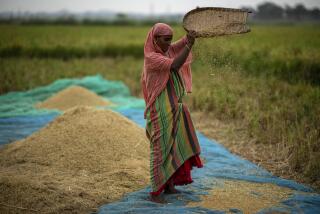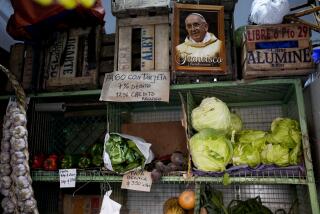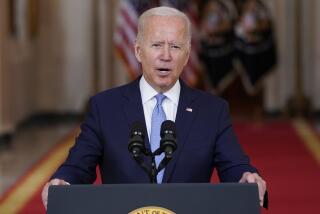Emergency funding for Latin America
- Share via
WASHINGTON — With soaring food prices triggering unrest and threatening Latin America’s economic progress, the Inter-American Development Bank on Wednesday announced an emergency credit line for countries in the region.
The $500-million fund will support projects that improve agricultural productivity, invest in rural areas, improve distribution and strengthen programs designed to improve health and encourage education.
“If nothing is done, the hard-won gains in the fight against poverty could be undermined,” said Luis Alberto Moreno, president of the publicly owned bank. “The risk for the region is very real.”
Moreno said that between January 2006 and this March, worldwide food prices had risen 68%, with the cost of rice doubling, corn prices rising 128% and wheat up 163%.
The bank is trying to act before the full effect of those price increases trickles down to consumers, Moreno said. “Price shocks are not transmitted immediately, that’s why it’s important to act now,” he said.
Bank officials also acknowledged worries about the spread of food-related unrest.
“It might just be that food turns out to be the spark that lights conditions that were already there,” said Santiago Levy, a bank vice president.
The credit line includes a $24.5-million grant for Haiti, where riots over the price of rice forced Prime Minister Jacques Edouard Alexis out of office in early April.
Moreno, formerly Colombia’s ambassador to the United States, met Wednesday with finance and agriculture ministers from Central American countries to discuss the crisis. The emergency funding is expected to gain swift approval from the bank’s executive board.
The bank estimates that up to 26 million people could fall into extreme poverty if prices for staples such as wheat, corn, beef, soy, sugar and rice experience a sustained 30% increase.
The region’s close ties to the U.S. economy also are having an effect.
Recent economic projections by the U.N.’s Economic Commission for Latin America and the Caribbean found that the U.S. economic slowdown could reduce the region’s GDP growth by 1% compared with 2007.
“For Latin America and the Caribbean, the U.S. slowdown is bad news,” Levy said. “It’s reduced remittances, reduced exports [in addition to] the shock of oil prices.”
The bank’s announcement comes on the heels of another funding initiative.
In late April, the presidents of Venezuela, Cuba, Bolivia and Nicaragua created a $100-million fund for food staples in Latin America. They also announced they would institute price controls.
In contrast, Levy said, the bank would actively discourage borrowing countries from adopting price controls and urge them to “stay away from reactionary policies that are unsustainable.”
--
More to Read
Sign up for Essential California
The most important California stories and recommendations in your inbox every morning.
You may occasionally receive promotional content from the Los Angeles Times.










